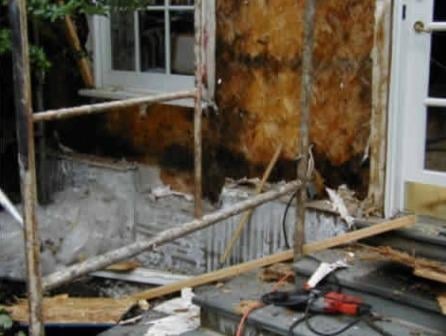
Related Posts




Probably the single most important benefit of any rain screen system is that it creates a “wall cavity” between the building envelope and the cladding material. The wall cavity allows moisture trapped inside the building to egress and therefore minimize the potential for mold. Mold creates rot which leads to decay and an unhealthy living environment. With wood furring strips, you are actually adding a food source for mold to develop.
Since wood is a hygroscopic material (absorbs moisture), the last thing you want to do in a design or while building is to leave exposed wood in direct contact with the building envelope. It defeats nearly the whole purpose of a rain screen. If you are using 2-1/2” wood furring strips at 16” on center, the net result is that you are covering roughly 20% of the building envelope with wood furring strips. Stated another way, you are preventing 20% of the structure from being able to ventilate properly.
In other words, a rainscreen design using wood furring strips is, at best, only 80% effective, before it is even installed. While an 80% effective rain screen system is certainly much better than no rain screen at all, why should you have to settle for less when there are better rainscreen options available? Architects and builders often ask us if hardwood furring strips are better than softwood furring and, although the answer is “yes”, it is a matter of degrees. It is true that hardwood furring strips are denser and therefore less hygroscopic than softwood furring strips and have less of a tendency to rot. Any wood furring strip, however, under the right trapped moisture conditions, has the ability to harbor and feed mold and may eventually rot over time.
The Climate-Shield Rain Screen system is designed to eliminate the need for wood furring strips altogether. The Climate-Shield Rain Screen Clip can be fastened directly into structural sheathing such as plywood or OSB. The precision manufactured size of each rainscreen clip creates a perfectly uniform wall cavity behind the siding. Because of the small size of the rain screen clip, only 2% of the building envelope is in contact with the clips. In other words, the Climate-Shield system is 98% effective by design. Equally important, since the Climate-Shield Rain Screen clips are also made from highly durable marine grade aluminum, they are not a food source for mold. Consider using the Climate-Shield system for your next rain screen design project.
furring strips altogether. The Climate-Shield Rain Screen Clip can be fastened directly into structural sheathing such as plywood or OSB. The precision manufactured size of each rainscreen clip creates a perfectly uniform wall cavity behind the siding. Because of the small size of the rain screen clip, only 2% of the building envelope is in contact with the clips. In other words, the Climate-Shield system is 98% effective by design. Equally important, since the Climate-Shield Rain Screen clips are also made from highly durable marine grade aluminum, they are not a food source for mold. Consider using the Climate-Shield system for your next rain screen design project.
Learn more by visiting our website for additional information about rain screen design, hardwood siding options, the Climate-Shield Rain Screen System and lots more:
Climate-Shield Rain Screen System
Understanding Wood Rain Screen Design
Architectural Details for Wood Rain Screens
REQUEST A FREE RAINSCREEN QUOTE
For a wealth of valuable information about wood rain screen design and installation please download our FREE white paper, “The Ultimate Guide to Building Green with Rain Screen Wood Siding”.


